
You are reading:

You are reading:
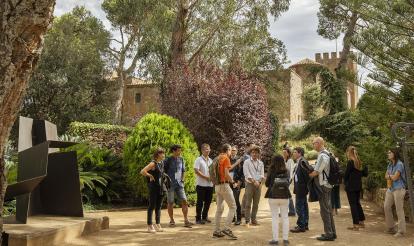
28.02.24
8 minutes readIt’s not every day that a group of scientists of the highest calibre from different disciplines meet up to discuss, share knowledge and jointly seek solutions to the current and future challenges facing their profession. This is precisely what happened at the second edition of the CaixaResearch Health Meeting, which brought together around 40 leading researchers from different areas of biomedical and health research in Spain and Portugal.
During the two-day meeting, the scientists discussed in depth the challenges affecting the present and future of research and innovation in biomedicine and health, and sought to address common concerns. How can we stimulate new discoveries and paradigm shifts to tackle diseases that still defy conventional therapies? Should the relationship between basic science and clinical researchers change? What role will patients play in the future? What strategies would help maximise the social impact of research? And how can we speed up the transfer of knowledge from the laboratory to the marketplace?
The sessions took place last September in the Cap Roig gardens as the closing event of the CaixaResearch Health call 2019, which awarded grants to 25 projects.
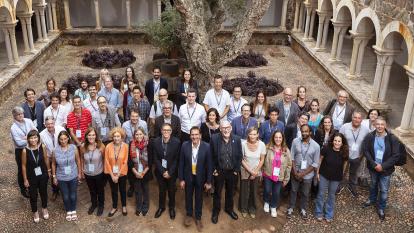
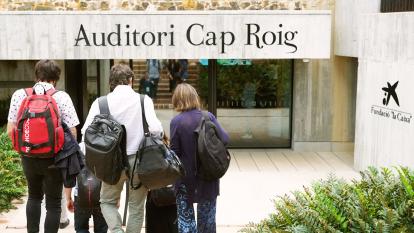
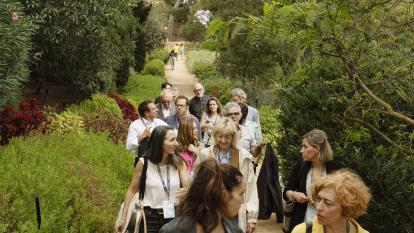
A common concern of those attending the meeting was that scientific knowledge often does not flow as it should among researchers. Bridging this distance, this gap, would be highly beneficial as it would allow scientists to accelerate their discoveries. According to the experts themselves, the solution is to approach projects with research teams that are more multidisciplinary, to break down the barrier between basic and clinical research, but that is not as simple as it seems. As an example of good practice, they mentioned the sharing of information between teams around the world during the recent COVID-19 pandemic.
“It’s vitally important to build bridges between basic researchers and clinicians,” noted IMED Lisbon researcher Helena Florindo. Moreover, if scientific findings are to be efficiently translated into clear benefits for people, it is also essential to involve patients in the process. According to Florindo, “it’s essential to put patients at the centre, because they play a crucial role in guiding basic research.”
Researchers of the calibre of José Jalife (CNIC), Oscar Vilarroya (UAB), Carmen Gil (CIB-CSIC) and Raúl Méndez (IRB Barcelona) confirmed that the active participation of patients allows for a better understanding of their medical and social needs, and of the diseases to be treated. The scientists pointed out that this involvement would greatly assist doctors in answering essential questions, such as which treatments are the most effective and feasible based on the individual needs of each patient. It would also help to raise awareness of certain types of disease.
Florindo pointed out that in the case of biomedical research, the involvement of all actors responsible for carrying it out should be promoted, not just the researchers but also funding agencies, research structures and centres, national health systems and companies related to the sector.
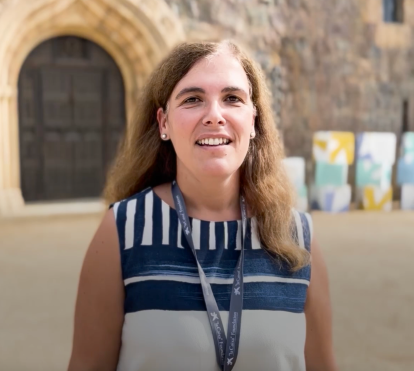
In order to involve society in research, Michela Bertero, director of strategy at IDIBAPS, says it is essential for scientific institutions to help researchers interact with other professionals. “It’s crucial for researchers to be open to new types of collaborations that include patient associations, educators and even game designers, to name but a few. And these activities should be recognised in researchers’ careers.”
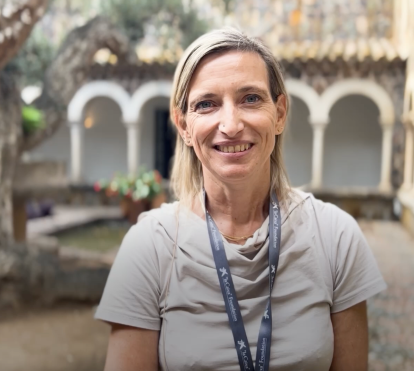
The ultimate goal of biomedical research is to understand, prevent, treat and cure disease. The aim is to provide better quality in diagnoses and treatments, as well as to improve the prevention and cure of disease. A direct relationship with patients and society at large is essential for all of this. Of course, it is important to remember that not all research projects have the same needs. Some, for example, require the transfer of data and participation in clinical studies that help to improve treatments. In other cases, the public can play a vital role in collecting data to help design strategies to prevent epidemics.
In this context, four researchers presented their experiences of working with different professionals and with citizens themselves, which proved to be diverse in terms of both the form and the degree of involvement of the participants.
Blanca Fuentes’ team at the Hospital La Paz Institute for Health Research (IdiPaz), has used the dubbing of TV series and films to help people with aphasia recover their speech following a stroke. The researcher highlighted the key role played by the collaboration with the Aphasia Patients Association, from which the original proposal originated. “It’s a great example of close collaboration between patients and researchers,” she said. Meanwhile, Manuel Carreiras, from the Basque Centre on Cognition, Brain and Language (BCBL), explained various strategies for involving the public in his studies on the functioning and development of dyslexia. For example, Carreiras and his team have promoted a large-scale study involving 2,000 students in the Basque Country, aged between nine and 16, with the aim of understanding how dyslexia develops and how to detect it at an early stage.
Several scientists also highlighted the benefits of new technologies in advancing their studies. In some cases, the development of applications, websites or specific forums is the key to their projects. This is the case with the work of Frederic Bartumeus at the Blanes Centre for Advanced Studies, CEAB-CSIC. Thanks to real-time data provided by people through a mobile application, his team maps the presence of mosquito species that transmit infectious diseases, enabling the monitoring of possible outbreaks of dengue, chikungunya and Zika in Spain. In the same vein, Leonor Saúde, from the Institute of Molecular Medicine (iMM) in Lisbon, explained how a simple video game for children can help raise awareness among young people by helping them understand how the nervous system works and thus prevent accidents and spinal cord injuries.
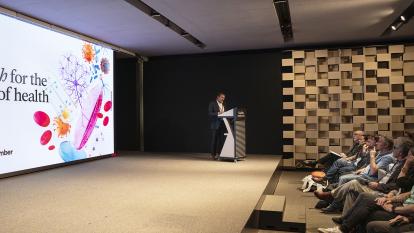
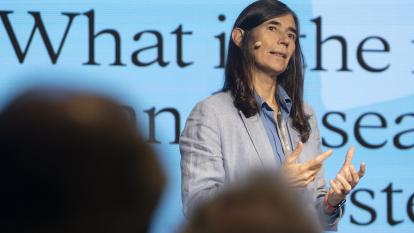
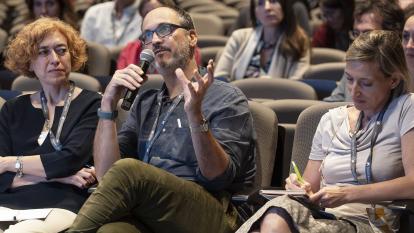
The final session of the CaixaResearch Health Meeting featured Luis Serrano, director of the Centre for Genomic Regulation (CRG); María A. Blasco, scientific director of the Spanish National Cancer Research Centre (CNIO); and Bruno Silva-Santos, vice-director of the Institute of Molecular Medicine (iMM) in Lisbon. They all shared their personal contact with innovation and entrepreneurship from both sides of their extensive experience: as leaders of their own research groups and entrepreneurs, and as directors of leading research centres.
All three speakers agreed on the importance of supporting and professionalising innovation and the creation of spin-offs in research centres as an essential step in attracting the funding needed to turn scientific results into solutions of value to society and, in turn, to further improve science in both Spain and Portugal. As Bruno Silva-Santos explained, “A major breakthrough for our institute was the recruitment of the right person for our technology transfer office, who revolutionised our approach to the process. Today, we’ve already created five spin-offs, formalised more than 300 contracts and licensed 50% of our patents. Having the right person with the right vision is crucial.”
For her part, María Blasco, who received a grant from CaixaImpulse in 2018 to develop an anti-cancer drug, pointed out that “not only do we need to make scientific discoveries that can change the way we treat diseases, but we must also take a step forward and ensure that those discoveries leave the laboratory and become solutions that improve people’s lives, and to do this we have to be committed to innovation and transfer.”
Luis Serrano also argued, from his own experience, that excellence in research and the translation of its results are not poles apart: “The curiosity that drives science is compatible with the search for an application of what has been researched.” Serrano also called for institutional support for technology transfer. “It cannot all be left in the hands of the researcher: there must be competent professionals and adequate funding.”
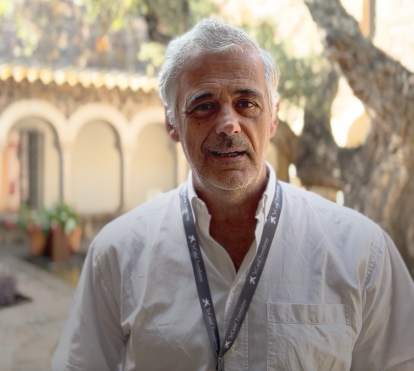
In short, the experts stressed the importance of having a team that not only thinks about doing great research that ends up in the world’s top scientific journals, but also pursues the transfer of results. Scientists are now more aware than ever that having knowledge transfer specialists within the research centres themselves is essential if their studies are to be translated into, for example, new therapies, diagnostic methods or medical devices that can improve people’s lives.
Continuing to foster this scientific entrepreneurship, creating multidisciplinary and diverse teams, involving patients themselves in basic research, encouraging scientists to collaborate with other professionals to maximise social impact or embracing new technologies... The road ahead is being mapped out and will determine the major current and future challenges for medical research in the coming years. There is still a long way to go, but it seems clear to these researchers: Spain and Portugal have a bright future ahead.